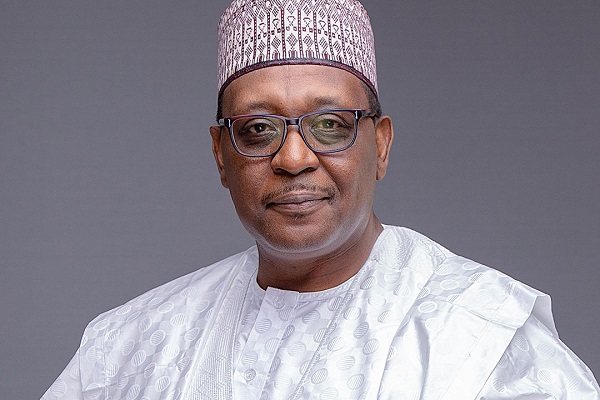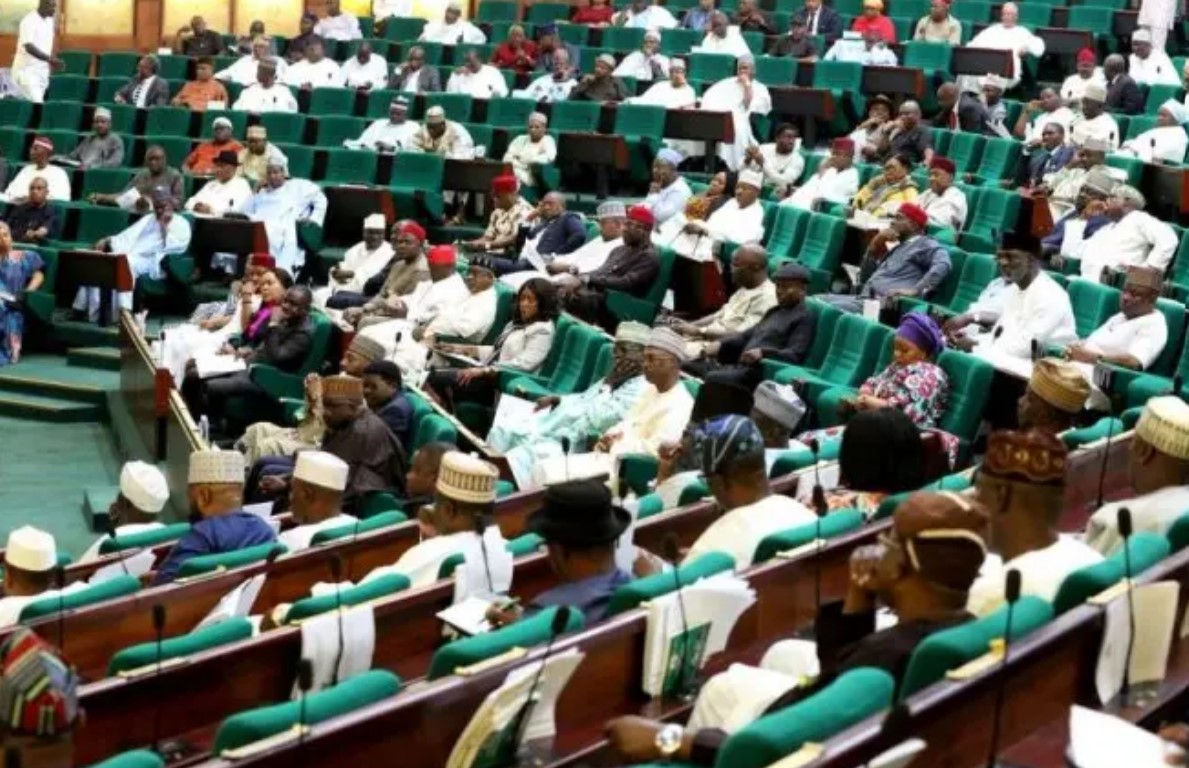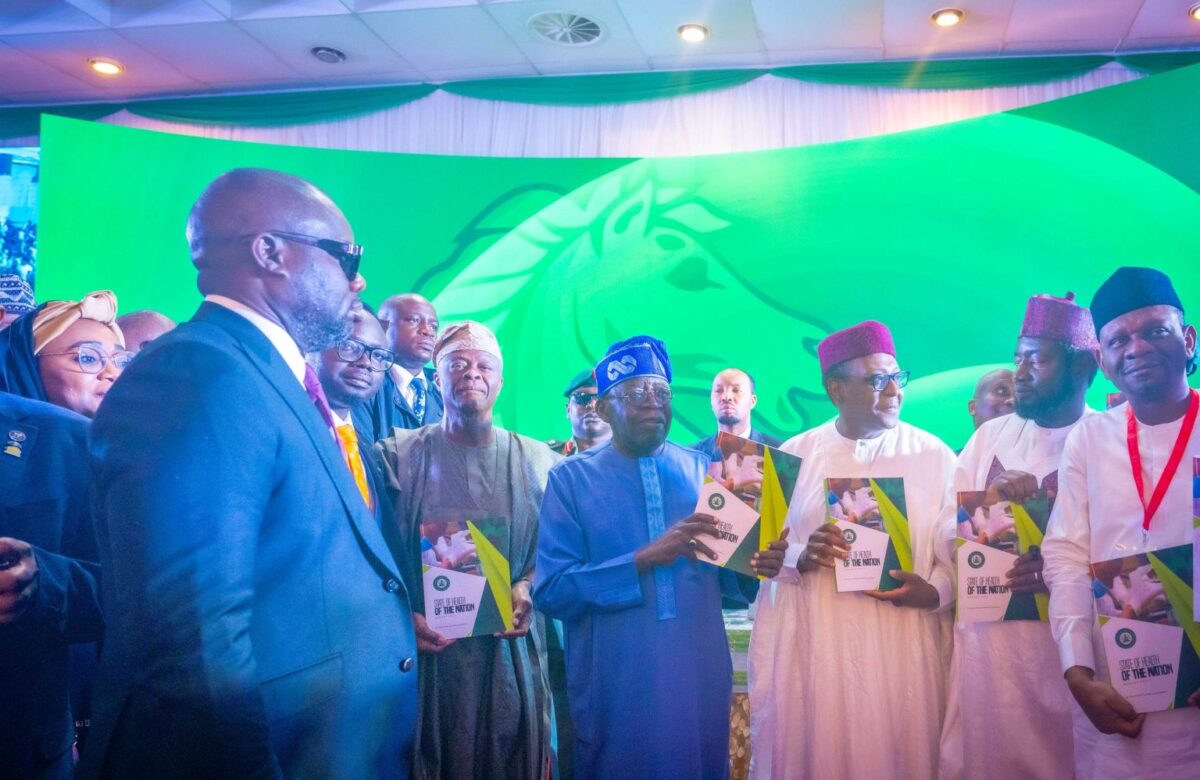
Nigeria’s Health Sector in 2024: Policies, Investments, Partnerships, and Milestones
- Health Sector
- No Comment
- 746

Nigeria’s health sector is undergoing a fundamental transformation, with the year 2024 marking bold policy reforms, strategic investments, and collaborative partnerships that are redefining the healthcare landscape. Under the leadership of Professor Mohammed Ali Pate, the Federal Ministry of Health and Social Welfare was recognised as the overall best-performing MDA and received three additional distinguished awards from the Servicom Office in the Presidency.
Reflecting on the achievements and recognition over the last year Prof. Pate said, “the awards are more than an acknowledgment of our efforts; they are a declaration that our collective work, systems, and early results are making a real difference in the lives of our people. These recognitions challenge us to do even more, and symbolise our unwavering commitment to excellence in service delivery and our promise to touch lives through quality healthcare.”
While notable milestones recorded this year reflect a renewed commitment to addressing systemic gaps and enhancing healthcare delivery in Nigeria, the successes and challenges of 2024 underscore the need for sustained collaboration, innovation, and collective effort in 2025 to ensure that no Nigerian is left behind in the quest for improved healthcare. As the health sector continues this trajectory, it remains critical to translate its ambitions into tangible outcomes, delivering the transformative impact envisioned by the government’s bold reforms.
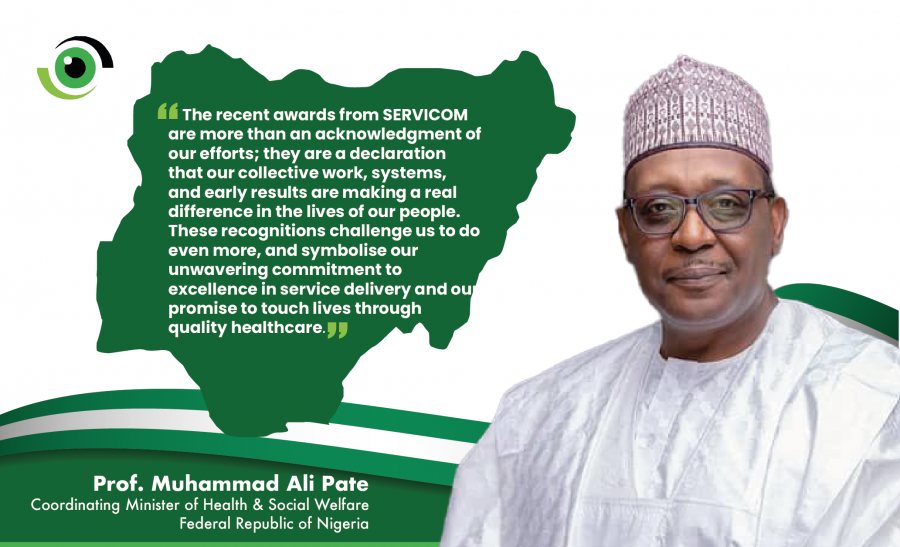
Policy Landscape
At the 64th National Council on Health in November 2023, Nigeria unveiled the Nigeria Health Sector Renewal Investment Initiative (NHSRII), which provides a unified roadmap to improve governance, reduce financial barriers, and address systemic challenges in healthcare delivery. Driven by the Sector-Wide Approach (SWAp), these efforts ensure that stakeholders operate under a single, unified strategy, enabling the Federal Ministry of Health and Social Welfare (FMoHSW) to streamline governance and prioritise areas with the greatest need.
In alignment with NHSRII, President Tinubu’s landmark Executive Order operationalised in October 2024, represents a bold policy shift to unlock Nigeria’s healthcare value chain. By removing tariffs and taxes on critical pharmaceutical machinery, raw materials, and equipment, as well as the introduction of market-shaping initiatives, such as framework contracts and volume guarantees, the Executive Order aims to boost local manufacturing, reduce healthcare costs, and position Nigeria as a global hub for health product manufacturing.
Critical policies such as the Health Workforce Migration Policy have been introduced to address the brain drain by improving working conditions and incentivising skilled professionals to remain within the country. With non-communicable diseases (NCDs) –responsible nearly 30% of all deaths in Nigeria– threatening to surpass communicable diseases, the launch of the key national NCD policies in August this year is both timely and crucial. By aligning these efforts with state-level operational plans, Nigeria aims to establish a robust healthcare governance framework that delivers meaningful results at the community level, where they matter most.
Investments in Health
The 2024 federal budget for health witnessed a notable increase, with allocations aimed at strengthening primary healthcare, improving infrastructure, and expanding health insurance coverage from 16.7 million to 19.2 million under a year. ₦37 billion was also disbursed through the Basic Health Care Provision Fund (BHCPF) to designated primary health care facilities, doubling previous allocations. This trend is consistent with the 2025 budget with ₦2.48 trillion allocated, representing 5.18% of the national budget. This is a marked rise from the ₦1.23 trillion allocated in 2024, signaling the Federal Government’s commitment to healthcare delivery in the country. “We are convinced that universal health coverage initiatives will strengthen primary healthcare systems across Nigeria. To this end, we have allocated ₦402 billion for infrastructural investment in the health sector for 2025,” said the president when presenting the 2025 budget to the National Assembly. However both the 2024 and 2025 budgetary allocation to health still falls short of the 15% benchmark set by the Abuja Declaration, raising concerns about its adequacy to actualise President Tinubu’s ambitious NHSRII. Similarly, only 5 of the 21 states in Nigeria that have revealed their health budget met the World Health Organization (WHO) and African Union benchmark of allocating 15% of budget to health. While initiatives like the Basic Health Care Provision Fund (BHCPF) saw expanded disbursements in 2024, doubling their previous allocation to support primary health centres, sizeable and sustained funding is essential to meet Nigeria’s healthcare demands effectively.
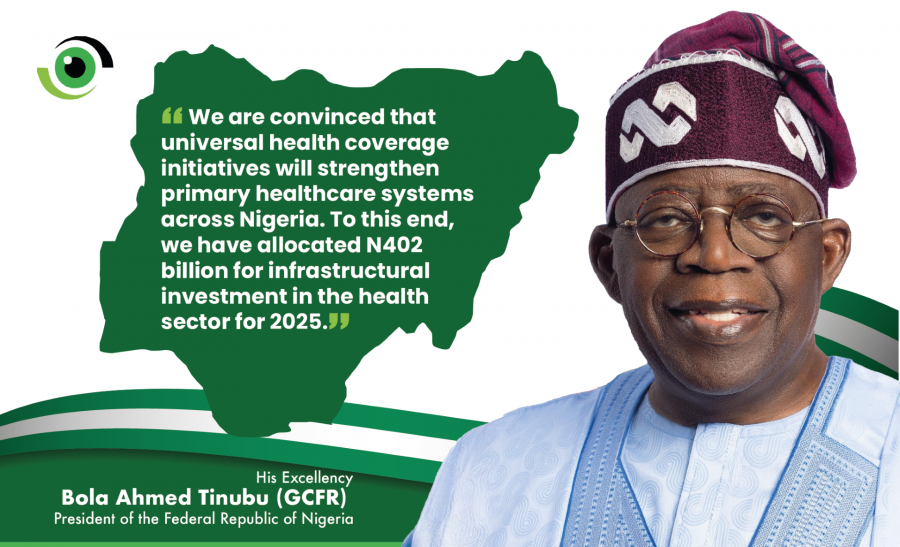
The Presidential Initiative for Unlocking the Healthcare Value Chain (PVAC), achieved a $5 billion project pipeline, $2 billion in foreign investments, and 74 transformative projects. Partnerships with Siemens Healthineers, BHR Biosynex, Vestergaard, GlaxoSmithkline (GSK), Abbott, BASF and Moderna, including establishment of clinical trials capacity, are aligned with the FG’s efforts to position Nigeria as a hub global hub for health product and technology manufacturing.
Complementary funding of over $3 billion was mobilised with the help of partners, including $2.1 billion confirmed, supplementing the Federal Government’s efforts. Additionally, a $1.57 billion facility from the World Bank was secured under the PHC Provision Strengthening Programme (HOPE-PHC) to strengthen and rehabilitate 17,600 PHCs and equip them with climate-resilient infrastructure.
Moreso, the launch of the Nigeria Sovereign Investment Authority (NSIA) Healthcare Expansion Programme in August 2024 seeks to establish ten world-class healthcare facilities, specialising in oncology and diagnostics across the Nigeria’s six geopolitical zones and retrain 120,000 frontline health workers.
Partnerships and Collaborations
Central to the NHSRII is a strong emphasis on partnerships as a driving force for health sector transformation. A notable example is the WHO and PSHAN’s launch of the ‘Adopt-A-Healthcare Facility Programme (ADHFP)’ in August 2024, aiming to establish global-standard PHCs in all 774 LGAs. Similarly, platforms like the Industry Engagement Forum 2024, driven by PVAC ewith support from partners including Unitaid, Africa Development Bank (AFDB) have advanced stakeholder engagement and strategies for health product manufacturing, supporting AFDB’s $100 million Pharmaceutical Action Plan to strengthen Africa’s pharmaceutical ecosystem. Furthermore, the introduction of SWAp serves as a vital platform to streamline coordination among government tiers, and align the priorities of development partners within the health sector, promoting a unified framework of “One Plan, One Budget, One Report, and One Conversation”.
Key Milestones
In a first-of-its kind inclusive assessment of progress in advancing Nigeria’s health priorities, otherwise known as the Joint Annual Review, Coordinating Minister Prof. Muhammad Ali Pate announced that the Ministry had achieved 31 of the 41 key performance indicators across presidential commitments, with expectations to surpass targets by year-end. Under the PHC 2.0 reform, over ₦45 billion was directly disbursed to primary healthcare facilities across states, while complementary funding exceeding $3 billion, including $2.1 billion confirmed, was mobilised to strengthen healthcare delivery. Workforce development also saw considerable progress, with 40,000 frontline health workers retrained, surpassing annual targets toward the goal of 120,000. Additionally, over 2,600 healthcare facilities are in advanced stages of revitalisation, with 2,000 more slated for upgrades. The event highlighted the Ministry’s strategic focus on collaboration, accountability, and targeted interventions, including the unveiling of the Maternal and Newborn Mortality Reduction Investment Initiative (MAMII): FMHSW’s landmark initiatives aimed at tackling Nigeria’s critical high maternal and neonatal mortality rates — among the highest globally, prioritising the 174 high-burden Local Governments responsible for 50% of maternal deaths.
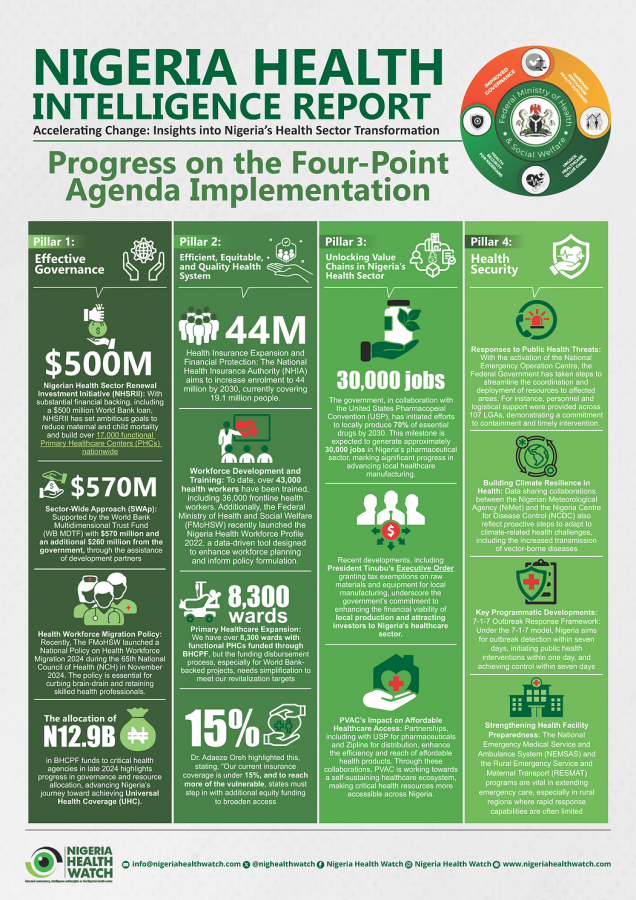
Notable Challenges
Despite year-on-year increases in funding and commendable achievements, the Nigeria Health Intelligence Report highlights persistent challenges limiting progress toward achieving UHC targets by 2030. Similarly, while national health insurance expansion efforts have made headway through BHCPF initiatives, experts underscore the need for additional state-level funding to broaden coverage. Dr. Adaeze Oreh, Honourable Commissioner for Health, Rivers State highlighted thisn while speaking with Nigeria Health Watch, stating, “our current insurance coverage is under 15%, and to reach more of the vulnerable, states must step in with additional equity funding to broaden access.” Additionally,delayed disbursement of the Basic Health Care Provision Fund BHCPF has hampered the timely implementation of critical programs, exposing the need for streamlined processes and improved inter-agency coordination. Workforce migration, driven by poor remuneration and working conditions, continues to deplete skilled professionals, widening service delivery gaps, particularly in underserved areas. Economic constraints and inflation have disrupted the pharmaceutical supply chain, escalating the cost of essential medicines and reducing accessibility for vulnerable populations. Addressing these issues will require investments in local manufacturing, enhanced logistics systems, and stronger regulatory frameworks to ensure consistent access to critical healthcare supplies.
While progress has been made in emergency response planning, with efforts to shape Nigeria’s climate change agenda such as a comprehensive vulnerability assessment, demonstrated political commitment and stakeholder engagement, gaps persist. Adherence to the 7–1–7 outbreak response strategy remains inconsistent, with only 25–40% of smaller outbreaks detected and managed within the desired timeframe, underscoring the need for targeted capacity-building at the state and regional levels. Many rural health centers remain under-equipped to address health shocks, despite interventions like National Emergency Medical Service and Ambulance System (NEMSAS) and Rural Emergency Service and Maternal Transport (RESMAT). Additionally, high maternal and neonatal mortality rates, compounded by malnutrition, stunting, and gaps in routine immunisation coverage, emphasise the urgency for targeted interventions. Poor coordination across agencies and funding delays further hinder program implementation, underscoring the need for stronger governance, accountability, and efficient processes to achieve sustainable progress.
Looking Ahead: Hopes for 2025
As we reflect on the year 2024, it is clear that a collaborative approach remains the greatest asset of Nigeria’s health sector. Delivering measurable outcomes through alignment of resources, partnerships, and enhanced accountability will require not just increased funding as seen in the 2025 ‘Budget of Restoration’, but strategic implementation driven by the Sector-Wide Approach to ensure these investments translate into tangible outcomes.
Strengthening governance through transparent budget tracking and regular performance reviews is essential to ensure resources are utilised effectively. Expanding workforce capacity with competitive incentives and professional development programs aligned with the health workforce migration policy will help retain skilled health workers, while investments in primary healthcare infrastructure and digital health integration can strengthen service delivery in underserved areas.
Additionally, improving supply chains by prioritising local production and streamlined distribution will minimise stock-outs and ensure consistent access to essential medicines. A focus on evaluating the progress of the president’s Executive Order, complementing PVAC’s efforts to offer incentives to those investing in the health sector, will be essential. This initiative aims to boost local health product manufacturing, reduce Nigeria’s over $1 billion annual medical tourism expenditure, and create jobs across the healthcare value chain. These combined efforts will be critical in achieving sustainable progress in Nigeria’s health sector in 2025 and beyond.
By Alexander Chiejina and Emeka Oguanuo (Lead Writers)
https://nigeriahealthwatch.medium.com/nigerias-health-sector-in-2024-policies-investments-partnerships-and-milestones-8b0370b81d70



